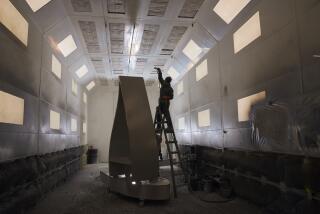Youths See Meter Work as Measure of Success
- Share via
Carlos Venegas says he doesn’t mind spending his summer on his hands and knees replacing water meters.
Venegas, 18, wearing a pair of work gloves, scoops mud and dirt from the underground residential meter boxes, often encountering spiders, mice and cockroaches. Though it’s nasty work, he said, “it’s made me become way more responsible.”
Venegas, who lives in Garden Grove and plans to go to college this fall, is one of nine young men employed by the Water Division’s Student Summer Youth Program, which this year is replacing aged residential water meters across Huntington Beach.
The work crews are replacing about 100 meters a day, and their goal is to replace 6,800 by summer’s end, said Armando De La Torre, water meter repair lead worker. So far, the tally is 2,500.
The Water Division started its summer program seven years ago as a way to replace old equipment inexpensively while giving disadvantaged youths a way to make some money and gain work experience. The high school-age hires earn from $5.60 to $8.50 an hour.
Participants say the program teaches them much more than just how to install the new electronic meters. They also learn how to test the equipment, rebuild commercial meters and deal with people.
Jose Lemus, 21, who started in the program three years ago, said he has learned supervisorial, customer service and computer skills. Now the program’s crew leader, Lemus also sees the program as a way to keep teens out of trouble.
“When they get an opportunity like this, they realize they can do a lot more with their lives than just hanging out in the streets,” said Lemus, of Huntington Beach, who is studying to become a probation officer.
De La Torre said that skills learned in the program enabled four former participants to find jobs with water divisions with other cities.
The program also benefits the city, De La Torre said. The old meters, which are more than 20 years old, are slowing down, he said, which means they indicate less water volume than the actual amount used.
With 46,000 residential and small commercial meters in the city, he said, that could result in a substantial revenue loss.
More to Read
Sign up for Essential California
The most important California stories and recommendations in your inbox every morning.
You may occasionally receive promotional content from the Los Angeles Times.













